Related Research Articles
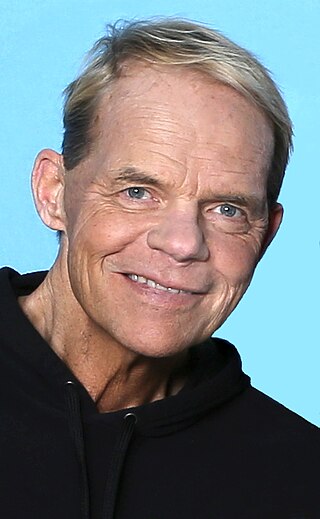
Lawrence Wendell Pfohl, better known by the ring name Lex Luger, is an American retired professional wrestler, bodybuilder, and football player. He is best known for his work with Jim Crockett Promotions, World Championship Wrestling (WCW), and the World Wrestling Federation.
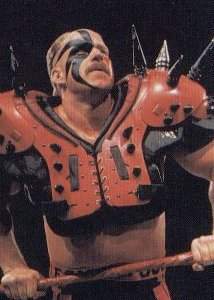
Michael James Hegstrand was an American professional wrestler. He was best known as Road Warrior Hawk, one half of the tag team known as the Road Warriors, with Road Warrior Animal. Outside of the Road Warriors, Hawk was a sporadic challenger for world heavyweight championships on pay-per-view from the late 1980s to the mid-1990s. He headlined the inaugural 1993 edition of Extreme Championship Wrestling's premier annual event, November to Remember.

Ronald Simmons is an American retired professional football player and professional wrestler. He is best known for his tenures in WWE and World Championship Wrestling (WCW). Prior to becoming a professional wrestler, Simmons played football as a defensive tackle in the National Football League (NFL), Canadian Football League (CFL) and United States Football League (USFL) for four seasons during the 1980s.
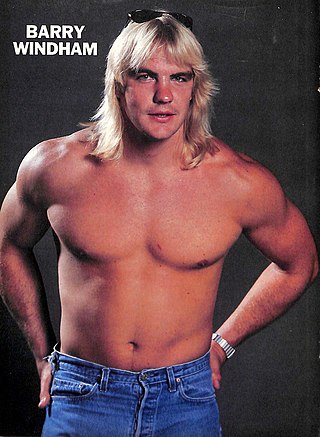
Barry Clinton Windham is an American retired professional wrestler. The son of wrestler Blackjack Mulligan, he is best known for his appearances with the National Wrestling Alliance (NWA) and World Championship Wrestling (WCW).
The Varsity Club was a professional wrestling heel stable in the NWA's Jim Crockett Promotions and World Championship Wrestling (WCW). The stable was formed in 1987 and lasted until 1989. The stable was resurrected in 1999–2004.
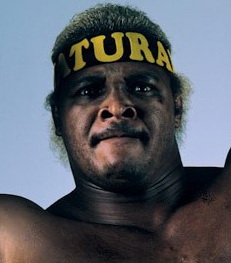
Bruce Franklin Reed was an American professional wrestler and football player, better known by the ring name Butch Reed. He played college football at the University of Central Missouri, was a star in Mid-South Wrestling and had high-profile tag team matches in the World Wrestling Federation and World Championship Wrestling.

Clash of the Champions is an American series of professional wrestling television specials that were produced by World Championship Wrestling (WCW) and Jim Crockett Promotions (JCP) in conjunction with the National Wrestling Alliance (NWA). The specials were supercards comprising pay-per-view caliber matches, similar to the World Wrestling Federation's Saturday Night's Main Event series. The Clash of the Champions shows were famous for typically not airing commercials during matches even though many of these matches lasted 20 minutes or more.

Capital Combat: Return of RoboCop was a one-time professional wrestling pay-per-view (PPV) event from the National Wrestling Alliance (NWA) held under the World Championship Wrestling (WCW) name. Capital Combat took place on Saturday, May 19, 1990, at the D.C. Armory in Washington, D.C. The show featured a promotional crossover with the imminent release of RoboCop 2, with RoboCop rescuing Sting from an attack by the Four Horsemen during the PPV.
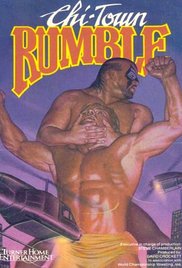
Chi-Town Rumble was a professional wrestling pay-per-view (PPV) event produced by World Championship Wrestling (WCW) under the National Wrestling Alliance (NWA) banner. It took place on February 20, 1989, at the UIC Pavilion in Chicago, Illinois.
The Hollywood Blonds is a name used by several professional wrestling tag teams over the years.
The Skyscrapers were a professional wrestling tag team in World Championship Wrestling in 1989 and 1990 in three distinct forms with members ”Big” Sid Vicious, ”Dangerous” Dan Spivey, and "Mean" Mark Callous, with The Masked Skyscraper making a one night appearance.
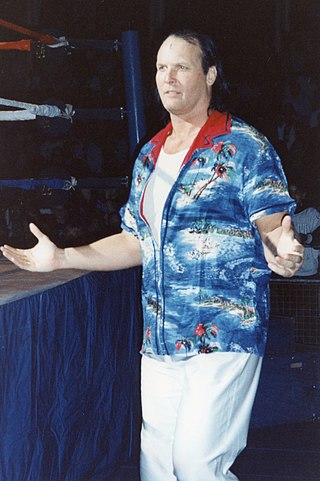
Daniel Eugene Spivey is an American retired professional wrestler best known under the ring names "Dangerous" Dan Spivey, Dangerous Dan The Left Hand Man, Danny Spivey, Mr. America, and Waylon Mercy, initially working under the name Starship Eagle. Throughout his career, he has worked extensively for World Championship Wrestling, the World Wrestling Federation, and All Japan Pro Wrestling. He retired from wrestling in 1995 due to injuries and now works in alcoholism counselling in his native Florida.

The Road Warriors, also known as the Legion of Doom, were a professional wrestling tag team composed of Road Warrior Hawk and Road Warrior Animal. They performed under the name "The Road Warriors" in the American Wrestling Association (AWA), the National Wrestling Alliance (NWA), and World Championship Wrestling (WCW), and the name "Legion of Doom" (LOD) in the World Wrestling Federation (WWF). Under either name, their gimmick was the same – two imposing wrestlers in face paint. For brief periods, other wrestlers were added as stand-in partners for both men. In Japan in the 1990s, Kensuke "Power Warrior" Sasaki often teamed with Hawk and Animal, separately and together, while in WWE were joined by Ahmed Johnson and Droz in the 1990s and Heidenreich in the 2000s. The team also had three managers: Sunny in the 1990s, Christy Hemme in the 2000s, and Paul Ellering, the manager associated with the original team.

The Diamond Exchange was a professional wrestling stable led by Diamond Dallas Page in the American Wrestling Association from 1988 to 1989. Page led a spiritual successor known as The Diamond Mine in World Championship Wrestling from 1991 to 1992.
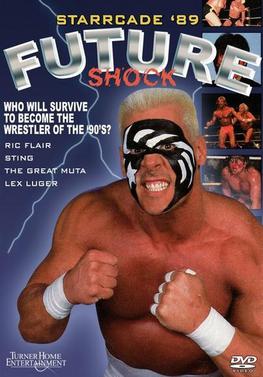
Starrcade '89: Future Shock was the seventh annual Starrcade professional wrestling pay-per-view (PPV) event produced under the National Wrestling Alliance (NWA) banner. It was the second Starrcade event produced by World Championship Wrestling (WCW), and it took place on December 13, 1989, at The Omni in Atlanta, Georgia.

Starrcade '90: Collision Course was the eighth annual Starrcade professional wrestling pay-per-view (PPV) event produced by World Championship Wrestling (WCW). It was the final under the National Wrestling Alliance (NWA) banner and the first under the World Championship Wrestling (WCW) banner. It took place on December 16, 1990, from the Kiel Auditorium in St. Louis, Missouri.

SuperBrawl was the inaugural SuperBrawl professional wrestling pay-per-view (PPV) event produced by World Championship Wrestling (WCW). The show took place on May 19, 1991 and was held at the Bayfront Center in St. Petersburg, Florida.
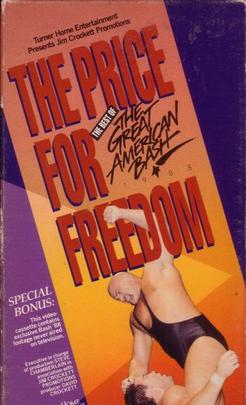
The 1988 Great American Bash was the fourth annual Great American Bash professional wrestling event produced by the National Wrestling Alliance's (NWA) Jim Crockett Promotions (JCP). It was the first Great American Bash event to air on pay-per-view (PPV), as the previous events aired on closed-circuit television. The event took place on July 10, 1988, at the Baltimore Arena in Baltimore, Maryland. This was the final NWA event produced by JCP and the third and final NWA event to be produced as a pay-per-view, as JCP was purchased by Turner Broadcasting System in November 1988 and was rebranded as World Championship Wrestling (WCW). This was also the first Pay Per View produced under the Turner Home Entertainment banner as the other two events were produced by The Wrestling Network.
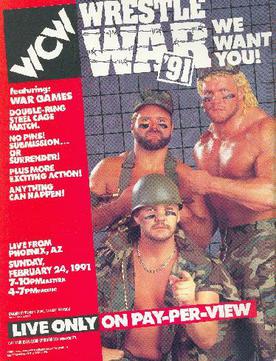
WrestleWar '91 was a professional wrestling pay-per-view (PPV) event produced by World Championship Wrestling (WCW). It took place on February 24, 1991 from the Arizona Veterans Memorial Coliseum in Phoenix, Arizona in the United States. In 2014, WrestleWar '91 was made available for streaming on the WWE Network.
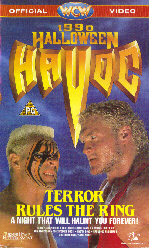
The 1990 Halloween Havoc was the second annual Halloween Havoc professional wrestling pay-per-view (PPV) event produced by World Championship Wrestling (WCW) under the National Wrestling Alliance (NWA) banner. It took place on October 27, 1990, from the UIC Pavilion in Chicago, Illinois. This was also the final Halloween Havoc produced by WCW under the NWA, as in January 1991, WCW split from the NWA.
References
- ↑ Shields, Brian (2006). Main event – WWE in the raging 80s (4th ed.). Pocket Books. ISBN 978-1-4165-3257-6.
- ↑ "NWA Clash of the Champions Results (VI)". prowrestlinghistory.com. Retrieved 2007-04-09.
- ↑ "NWA Halloween Havoc Results (1989)". prowrestlinghistory.com. Retrieved 2007-04-09.
- ↑ "NWA Clash of the Champions Results (IX)". prowrestlinghistory.com. Retrieved 2007-04-09.
- ↑ "NWA Starrcade Results (1989)". prowrestlinghistory.com. Retrieved 2007-04-09.
- ↑ "NWA Clash of the Champions Results (X)". prowrestlinghistory.com. Retrieved 2007-04-09.
- ↑ "NWA Capitol Combat Results". prowrestlinghistory.com. Retrieved 2007-04-09.
- 1 2 Greg Oliver and Steve Johnson (2005). The Pro Wrestling Hall of Fame: The Tag Teams. ECW Press. ISBN 978-1-55022-683-6.
- ↑ "WCW Halloween Havoc Results (1990)". prowrestlinghistory.com. Retrieved 2007-04-09.
- ↑ "WCW Starrcade Results (1990)". prowrestlinghistory.com. Retrieved 2007-04-09.
- ↑ "WCW Clash of the Champions Results (XIV)". prowrestlinghistory.com. Retrieved 2007-04-09.
- ↑ "WCW WrestleWar Results (1991)". prowrestlinghistory.com. Retrieved 2007-04-09.
- ↑ "WCW SuperBrawl Results (I)". prowrestlinghistory.com. Retrieved 2007-04-09.